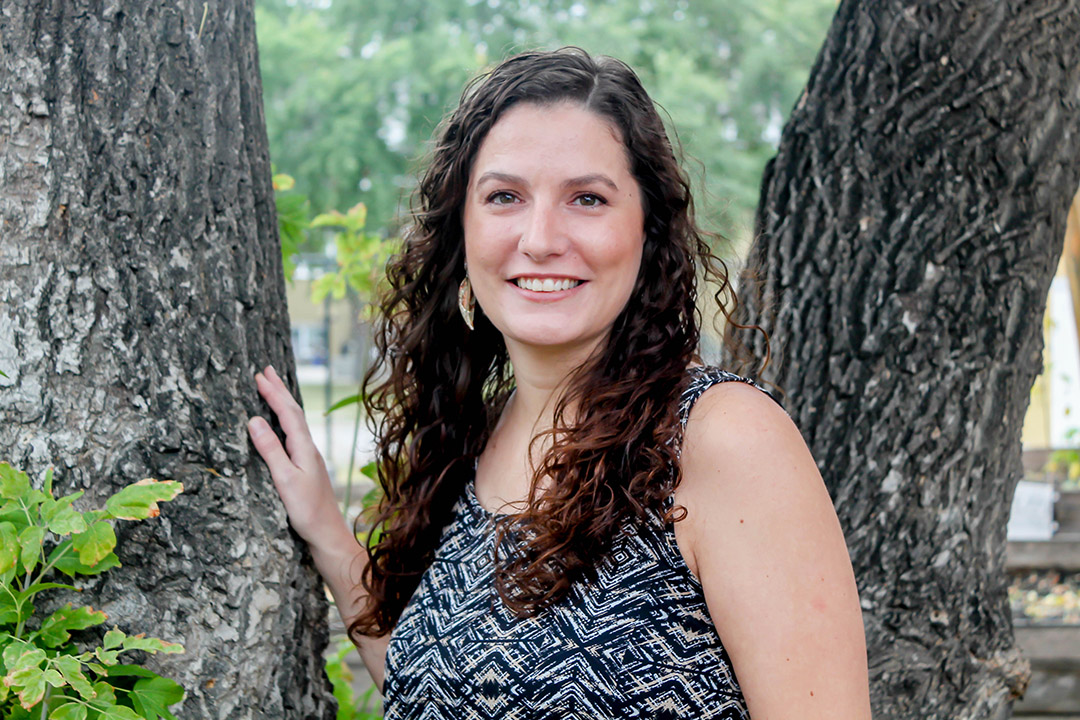
USask education student works towards a stronger and more resilient future
Striving to make her ancestors proud, Nicki Ferland is focusing in on land-based education.
By Ashley Sharp and John ShellingFerland is completing her Master of Education in Indigenous land-based education and is extremely proud of her Indigenous roots. Her mother’s grandfather was a wheelwright and the MLA for St. Vital in Louis Riel’s provisional government and her father’s grandfather established the community of Lorette, a Métis parish, with other Métis bison hunters and farmers.
Ferland will receive an award for academic excellence at this year’s Indigenous Student Achievement Awards on Feb. 6. Indigenous students from across the University of Saskatchewan (USask) will be honoured at a ceremony to recognize their academic excellence, leadership, research endeavours or community engagement.
The award ceremony is part of Indigenous Achievement Week (IAW), which celebrates the successes and contributions of Métis, First Nations and Inuit students, staff and faculty. The festivities include a public art project, speakers and celebrations in various locations across campus.
We asked Ferland a few questions about her time at USask and what motivates her.
Why did you choose the College of Education?
I love learning, and I love being an educator. I facilitate non-formal education programs for high school students and young adults at the University of Manitoba. After getting my Bachelor of Arts degree from the University of Winnipeg, I considered returning to school to pursue a graduate degree many times. It was actually the program, the Indigenous land-based education concentration in Educational Foundations, and the faculty that compelled me to return for my Master of Education at the University of Saskatchewan. The land-based focus, and the method of delivery (land-based field institutes), was a great fit for me as an Indigenous woman who can’t leave my family and community for long periods.
You come from a long line of determined individuals. How has their ambition inspired and motivated you to pursue your dreams?
I hope to make my ancestors proud – the buffalo hunters, farmers, moond d’goovernamaeñt, and warriors that laid the paths that have led me here. I also want to make those that come after me proud, and do some good work that will make their lives better and easier. My Michif language teacher, Heather Souter, explained that aanishkaapichikan actually translates to “knot,” like the knot in a chain, and means “what ties us together”. I’m one knot in my family chain, and I want to maintain its strength and integrity so that the next knots are stronger and resilient.
Where did your love for the land begin and when did you realize it was something that you wanted to pursue academically?
I was raised partly in a small Métis parish town and partly in the suburbs of Winnipeg, and I’m so grateful for both those opportunities to experience and build relationships with Indigenous land. As a child, I remember playing in a riparian forest by the Seine River in my hometown of Lorette, and it was so peaceful and fun and kind of dangerous, in hindsight. My family was and is really big into gardening, and I sincerely miss the garden wars we’d play at as children, when my sister and I would throw rotten beets and squash at each other in the fall. My father is a harvester, and he’d hunt and we’d fish (I didn’t actually like the patient mindfulness of fishing till I was older, but I did want to eat the pickerel cheeks), and there would be deer hanging in the garage in the winter months, so we learned how to butcher and prepare our food, and how to fillet a fish. I really loved all those things, and what they meant about my family’s lifestyle as Métis harvesters – that we were still living like the old ways.
What are your plans for the future?
I plan to pursue further studies when I complete my Master of Education, and continue educating Métis learners and others. I value Indigenous pedagogies, and I recognize the important role that land-based education plays in language and cultural resurgence. I especially like how urban land-based education flips the script and helps us confront urban myths about Indigenous people and Indigenous land.
This year’s Indigenous Achievement Week theme is Indigenous knowledge systems. How can Indigenous knowledge systems improve the world we live in?
The ways that Indigenous knowledge systems can improve the world are endless. Indigenous peoples had sophisticated, land-based education systems that enabled them to live well and sustainably for millennia. These knowledge systems continue to inform the way we interact with our environments, our land ethic; for instance, a recent UN report showed that biodiversity thrives on Indigenous managed land. That being said, I actually think that Indigenous knowledge systems are even able to improve the world we don’t live in – that is, imagining and creating Indigenous futurities.

